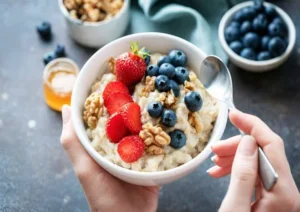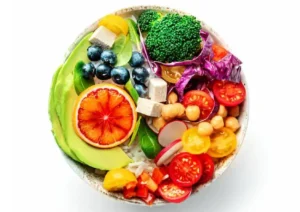Nutrition Food for Good Health:
Easy Choices for Lasting Wellness
Staying healthy isn’t just about luck—it’s usually about what goes on your plate.
The connection between what you eat and how you feel is pretty strong.
Your body does best when you have balanced meals filled with the right nutrients.
Making smart food choices can lead to lots of good stuff, like preventing diseases,
boosting your energy, and strengthening your immune system.
Let’s dive into what keeps your body working well and how to make nutrition a big part of your daily life.
Essential Nutrients for a Balanced Diet
Your body works like a bustling city. Every part needs its supplies to stay active and function properly.
This “supply list” includes six main nutrients: proteins, carbohydrates, fats, vitamins, minerals, and water.
Each one has its job, kind of like tools in a garage.
Macronutrients: Proteins, Carbohydrates, and Fats
Proteins help build muscles, repair tissues, and make enzymes. You can find them in foods like eggs, lean meats, beans, tofu, and Greek yogurt.
Carbs give your body quick energy. Enjoy whole grains, fruits, and veggies to feel full and keep your brain sharp.
Fats are great for brain health and help with vitamin absorption.
Go for healthy fats found in foods like olive oil, avocados, nuts, and fatty fish.
Keep fried and processed foods to a minimum.
Micronutrients: Vitamins and Minerals
Even though micronutrients are needed in smaller amounts, their effect is huge. Here are some key players:
- Vitamin C (in oranges, strawberries, bell peppers) boosts your immune system.
- Calcium (in milk, leafy greens, fortified plant milks) keeps your bones strong.
- Iron (in meats, lentils, spinach) helps your energy by moving oxygen in your blood.
- Potassium (in bananas, potatoes, beans) helps balance fluids and supports nerve function.
Mix colorful fruits and veggies, whole grains, lean proteins, and dairy into your meals to hit these targets.
The Importance of Hydration

Water keeps everything running smoothly. It carries nutrients, flushes out toxins,
and helps control your body temperature.
Try to drink enough so your pee stays light yellow.
Carry a reusable water bottle with you to remind you to sip throughout the day.
Herbal teas and water-rich foods like cucumbers and watermelon are helpful too.
Top Nutrition Foods for Good Health
Good eating isn’t just about avoiding things—it’s also about enjoying what you can have. Some foods really pack a nutrient punch.
Fruits and Vegetables
These are full of vitamins, minerals, and fiber. Berries, citrus, spinach, broccoli, carrots, and tomatoes offer great health benefits.
Try to fill half your plate with fruits and veggies at every meal.
Whole Grains
Skip the white bread and rice. Go for whole grains like oats, brown rice, quinoa, and whole wheat bread.
They have more fiber and nutrients and keep you full, stable blood sugar, and digestion help.
Lean Proteins and Dairy

Choose fish, skinless poultry, eggs, beans, lentils, tofu, and low-fat dairy. These help build muscle,
keep you full longer, and offer important vitamins like B12 and D.
Tips for Adding Nutritious Foods to Your Day
Creating healthy habits doesn’t mean you have to eat salads all the time.
Small changes can make a big difference.
Meal Planning and Prep
- Plan your meals for the week ahead so you’re not making unhealthy choices last minute.
- Cook big batches of grains or roast a tray of veggies and store them for easy meals.
- Keep basic items handy, like canned beans, frozen fruits, and eggs.
Healthy Snack Swaps
- Swap chips for air-popped popcorn or roasted chickpeas.
- Snack on apple slices with peanut butter, Greek yogurt with berries, or veggie sticks with hummus.
- Pack nuts, dried fruit, or cottage cheese for a quick energy boost on the go.
Wrapping Up
Eating well is about balance, variety, and taking small steps.
Focus on wholesome foods that energize your body and mind daily.
Try a new veggie, switch in whole grains, or bring your water bottle to work.
Every bite gets you closer to feeling great, one meal at a time.
HOSTINGER HOSTING PACKEGE DISCOUNT CODE

Normally I don’t read post on blogs, but I wish to say that this write-up very forced me to try and do so! Your writing style has been surprised me. Thanks, very nice post.
I don’t think the title of your article matches the content lol. Just kidding, mainly because I had some doubts after reading the article.
Your point of view caught my eye and was very interesting. Thanks. I have a question for you. https://accounts.binance.info/fr-AF/register?ref=JHQQKNKN
Can you be more specific about the content of your article? After reading it, I still have some doubts. Hope you can help me. https://www.binance.info/zh-TC/register?ref=DCKLL1YD
Your point of view caught my eye and was very interesting. Thanks. I have a question for you.
Your point of view caught my eye and was very interesting. Thanks. I have a question for you. https://www.binance.info/sl/register?ref=I3OM7SCZ
Thank you for your sharing. I am worried that I lack creative ideas. It is your article that makes me full of hope. Thank you. But, I have a question, can you help me? binance register
Thank you for your sharing. I am worried that I lack creative ideas. It is your article that makes me full of hope. Thank you. But, I have a question, can you help me?
I don’t think the title of your article matches the content lol. Just kidding, mainly because I had some doubts after reading the article. https://www.binance.info/en-NG/register-person?ref=JHQQKNKN